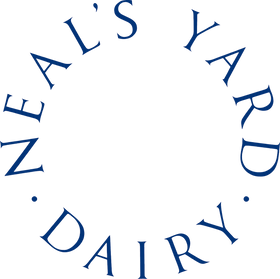Made by Fraser Norton & Rachel Yarrow
Llangadog, Camarthenshire
Norton and Yarrow is one of only a handful of dairy goat farms in the UK using a pasture-based, extensive farming system.
From 2016 to 2024, Fraser Norton and Rachel Yarrow made their signature lactic goat’s cheeses at Earth Trust, an environmental charity in Oxfordshire. In early 2025, they took a leap of faith and purchased Pencrug, a 120-acre farm in Carmarthenshire. During their time at Earth Trust, Rachel completed a Master’s degree on indoor and outdoor systems in the UK dairy goat sector and was awarded a Nuffield Fellowship to explore the potential for pasture-based goat dairying in the UK—a system that remains very rare. These experiences led Rachel and Fraser to the realisation that it was time to put their research into practice.
Now settled at Pencrug with their herd, they are focusing on developing hardy, thrifty cross-bred goats, and have begun replanting historical hedgerows to enrich the grazing on land more than ten times the size of what they had access to at Earth Trust.
Previously, the milk supply for Sinodun Hill was occasionally supplemented with bought-in milk to meet peak demand. From now on, Norton & Yarrow will make cheese exclusively with milk from their own herd. This may mean that availability of this special cheese is limited at times—but we believe the benefits of connecting a farming system directly to the cheese it produces, and supporting a pioneering approach to sustainable, extensive goat dairying, are well worth it.
Sinodun Hill arrives with us when just a week or two old. We keep the cheese in one of our warmer maturation rooms, as this encourages the growth of its rind and develops its flavour.
Colsten Basset is the BEST stilton. Quality cheese every time
Thank you so much for your feedback Graham - we appreciate it!
All the best,
NYD
Absolutely delicious as usual
Your feedback is much appreciated Joanne. Thank you for sharing it with us.
Kind regards,
NYD
Sinodun Hill
Many thanks for your review MJB - it's much appreciated!
Kind regards,
NYD
Lovely creamy whipped texture and slight sweet taste, enjoyable with oat crackers.
We appreciate your feedback Dominic. Many thanks for sharing it!
Best wishes,
NYD
A very good goat, which carried in excellent good nick
Hi Rupert,
We're delighted to hear that Sinodun Hill went down well. Thank you so much for your review and feedback.
All the best,
NYD









